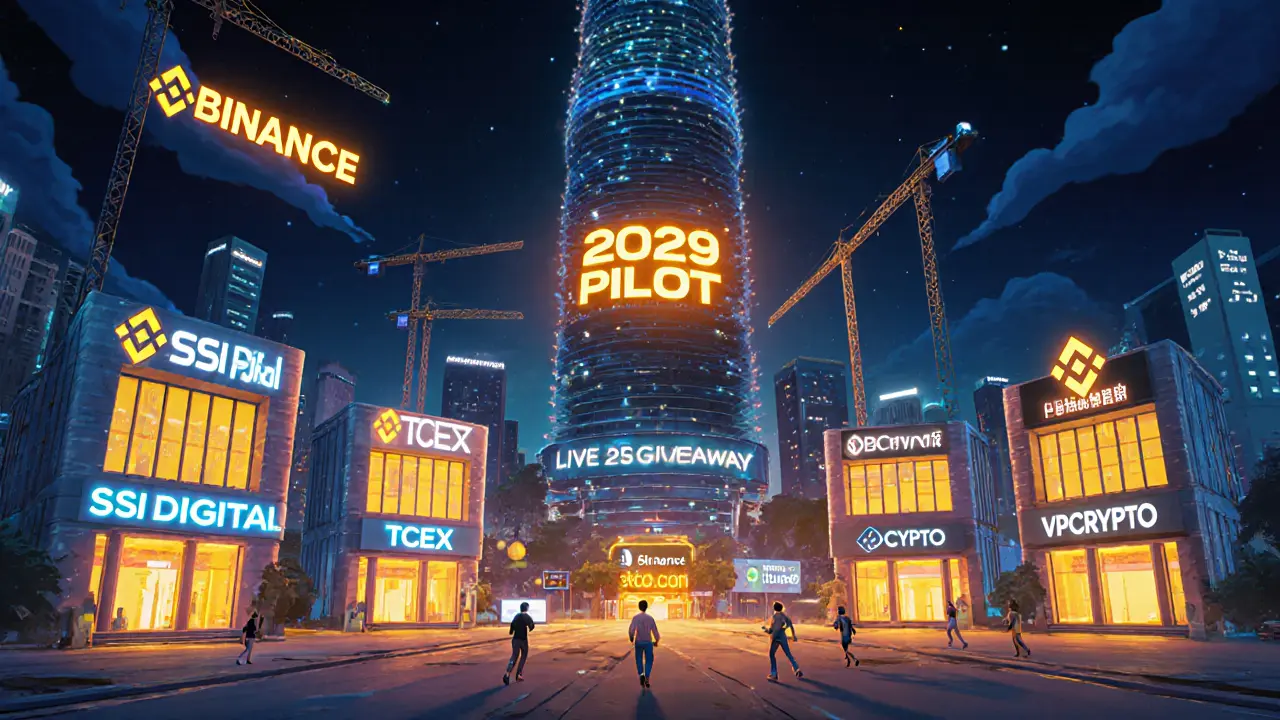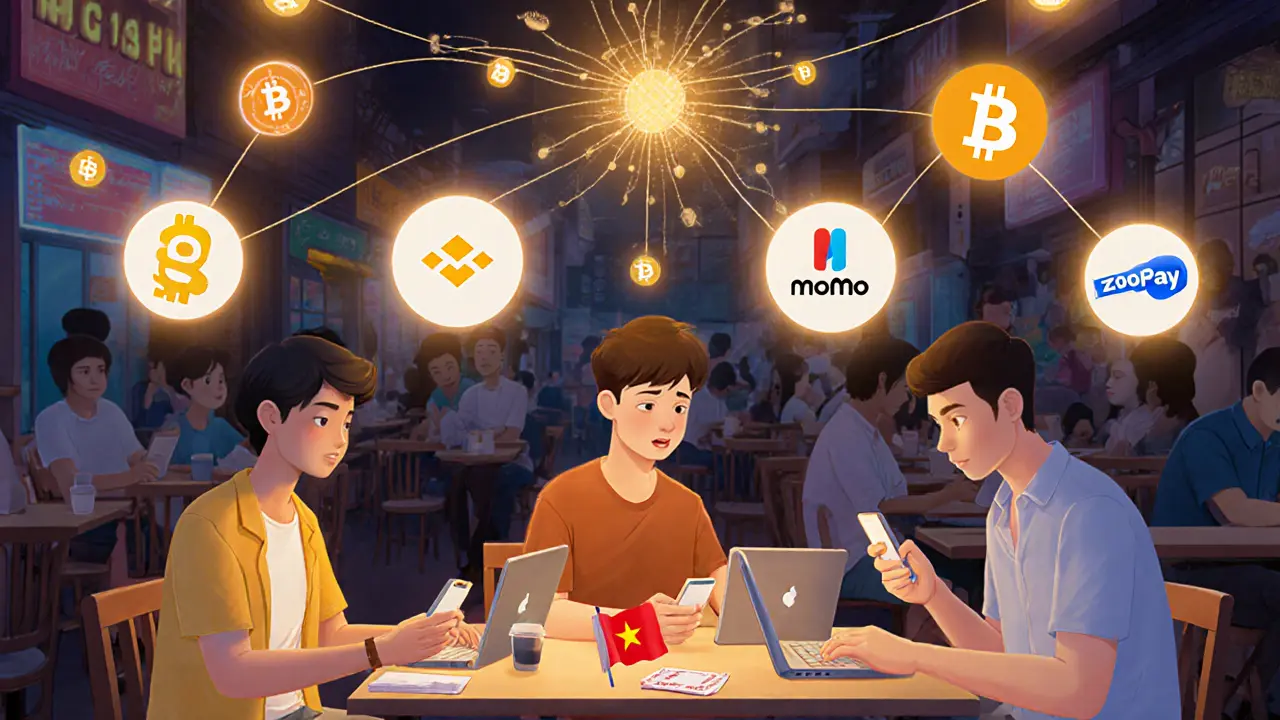Vietnamese Crypto Tax Calculator
Calculate Your Crypto Tax
Vietnam charges a 22% capital gains tax on all crypto profits. This calculator helps you determine your tax liability based on your transactions.
Tax Calculation Results
Important Notes
• Vietnam imposes a 22% capital gains tax on all cryptocurrency profits.
• No exchange provides tax reports - you must track all transactions manually.
• Consider using tools like Koinly or CoinTracker to calculate gains and losses.
• Failure to report can lead to penalties if audited by the government.
• Always maintain records of all your crypto transactions.
Vietnam has one of the highest rates of crypto ownership in the world - over 21 million people, or 21% of the population, hold digital assets. But here’s the catch: you won’t find a single government-approved crypto exchange operating like a bank. Instead, Vietnamese traders have built a thriving underground economy around global platforms, P2P networks, and clever workarounds. This isn’t about breaking rules - it’s about navigating a system that hasn’t fully decided whether crypto is legal or not.
The Legal Gray Zone
In 2014, Vietnam’s State Bank declared cryptocurrencies weren’t legal tender. That didn’t mean they were banned. It meant they existed in limbo. For a decade, people bought Bitcoin, Ethereum, and Solana without fear of arrest, but without legal protection. Then, in January 2025, the government dropped Resolution 05/2025 - a five-year pilot program that finally gave crypto a temporary legal status. But with heavy strings attached. Only five exchanges can get a license. Each needs at least VND 10 trillion ($380 million) in capital. Two-thirds of that must come from institutional investors. And every trader must use Vietnamese dong (VND) to buy and sell. Foreign companies can own no more than 49% of any licensed platform. This isn’t about protecting users - it’s about control. The government wants to monitor every transaction, track every wallet, and keep the flow of money inside the country.How Traders Actually Get In
Most Vietnamese traders don’t wait for a licensed exchange. They use global platforms that adapted to Vietnam’s rules - and its people. Binance leads the pack. It handles nearly half of all crypto trading volume from Vietnam. Why? Because it speaks Vietnamese. It accepts deposits via MoMo, ZaloPay, and VNPay. It lets you trade VND for BTC, ETH, or USDT with a simple bank transfer. Over 28 Vietnamese banks are connected to Binance’s system. Deposits clear in under five minutes. Withdrawals take 15 to 30 minutes. That’s faster than most local banks. Other major players include Bybit, Bitget, MEXC, and HTX. Bybit is the favorite for futures traders - 68% of all trading volume on its Vietnamese platform comes from perpetual contracts. But leverage is capped at 25x, thanks to draft rules from the Ministry of Finance. MEXC and KuCoin attract users who want lower fees and early access to new tokens. OKX stands out for transparency - it publishes monthly proof-of-reserves audits, something few others do. For beginners, Remitano is simple. It’s a P2P marketplace where you buy crypto directly from a local seller. No complex interface. No KYC beyond a national ID. But it’s riskier. There’s no insurance. If someone scams you, you’re on your own.The KYC Reality
To trade on any of these platforms, you need to verify your identity. Vietnam requires you to upload your National ID (CMND or CCCD) and take a live selfie. The system matches your face against the government’s citizen database. If your ID photo is blurry, your lighting is bad, or you’re wearing glasses - your application gets rejected. One Reddit user reported being denied three times before getting approved on OKX. The process usually takes 24 to 48 hours. Binance and Bybit are fastest - often under 18 hours. Kraken and Coinbase? They don’t support VND directly. You have to buy USDT on a P2P platform first, then transfer it. That adds steps, fees, and risk.
P2P Is the Backbone
Even on Binance, most VND deposits come from P2P trades. You’re not buying from a bank - you’re buying from a person. A student. A shop owner. A freelancer. They deposit VND into your bank account. You send them crypto. It’s peer-to-peer, cash-like, and decentralized. But it’s not safe. In Q3 2025, Vietnam’s National Cyber Security Center recorded 4,200 reported cases of P2P fraud. Scammers pose as sellers, take your money, and disappear. Or they reverse bank transfers after you send crypto. The fix? Always use escrow. Never send crypto until the VND hits your account. And stick to sellers with high ratings and long histories.Why Binance Dominates
Binance isn’t just big - it’s built for Vietnam. It runs ads on TikTok and YouTube in Vietnamese. It sponsors esports teams like Team Secret. It ran a $5 million BTC giveaway in Q3 2025 that attracted 250,000 new users. It has a 24/7 Vietnamese customer support team. Response time? Under 15 minutes. Its liquidity is unmatched. The spread for BTC/VND is just 0.08%. On Bybit, it’s 0.12%. On OKX, it’s 0.15%. That means you pay less to buy and sell. For active traders, that adds up fast. But it’s not perfect. Users complain about slow customer service during market crashes. One thread on WebTruyen had 147 people stuck with unverified accounts after Binance changed its KYC rules in August 2025. Another common issue: bank freezes. If you deposit more than VND 100 million ($4,000) in one go, your account might get flagged. The workaround? Split big deposits into smaller chunks - under $4,000 each.The New Local Players
In September 2025, the first local exchanges started applying for licenses. SSI Digital, Techcom’s TCEX, VIXEX, VPBank’s VPCrypto, and MBBank’s MB Crypto all submitted applications. But none are live yet. Their capital requirements are tiny compared to global giants - SSI Digital has VND 200 billion ($1.36 million). That’s less than 1% of what Binance has invested in Vietnam. They’re not ready to compete on liquidity, speed, or user experience. But they’re building for the future. Once the five licenses are granted, these banks could become the only legal gateways to crypto. That would change everything.
What Traders Wish They Knew
Most Vietnamese traders learn the hard way. Here’s what they’ve figured out:- Use multiple P2P sellers. Don’t rely on one.
- Never keep large amounts on exchanges. Move crypto to a hardware wallet like Ledger or Trezor.
- Track your taxes. Vietnam charges 22% on crypto gains. No exchange gives you a tax report. You have to calculate it yourself.
- Avoid trading during peak hours (7-9 PM). Network congestion causes delays and failed transactions.
- Join Vietnamese crypto Telegram groups. The biggest one, “Crypto Vietnam Official,” has over 48,000 members. They share tips, warn about scams, and alert each other to platform outages.
The Future Is Unclear
The government says this five-year pilot will end in 2029. What happens after? Will licensed exchanges become the only option? Will P2P be banned? Will banks be forced to cut off crypto-related transactions again, like they did in 2023? Right now, traders are betting on continuity. They assume the pilot will be extended. They assume global exchanges will keep serving Vietnam. They assume P2P will survive. But the risk is real. One new decree, one sudden policy shift, and the entire ecosystem could collapse overnight. That’s why the smartest traders are diversifying - using multiple platforms, keeping cash reserves, and staying informed.Final Reality Check
Vietnamese traders aren’t tech rebels. They’re practical people using tools that work. They don’t care about decentralization. They care about getting VND in and crypto out. They don’t want to be pioneers - they want to profit. The system is messy. It’s risky. But it’s working. For now.Can I legally trade crypto in Vietnam in 2025?
Yes - but only through approved channels. Since January 2025, Vietnam has allowed crypto trading under a five-year pilot program. You can trade on global exchanges like Binance and Bybit using VND, but only if you follow KYC rules. No unlicensed platforms are officially legal, though enforcement is inconsistent.
Which crypto exchange is best for Vietnamese users?
Binance is the top choice for most Vietnamese traders. It offers the deepest VND liquidity, lowest spreads, 24/7 Vietnamese support, and seamless bank transfers via MoMo, ZaloPay, and VNPay. Bybit is best for futures trading, while MEXC and KuCoin are better for low fees and new tokens. Remitano is easiest for beginners but carries higher P2P risk.
How do I deposit VND on crypto exchanges?
You can deposit VND through bank transfers (28 banks supported), e-wallets like MoMo and ZaloPay, or P2P trades. Binance, Bybit, and Bitget integrate directly with Vietnam’s NAPAS payment network. Deposits usually clear in 2-5 minutes. Avoid large single transfers - split them under VND 100 million ($4,000) to prevent bank freezes.
Do I need to pay taxes on crypto in Vietnam?
Yes. Vietnam imposes a 22% capital gains tax on crypto profits. No exchange provides tax reports, so you must track every trade manually. Use tools like Koinly or CoinTracker to calculate gains and losses. Failing to report can lead to penalties if the government audits your transactions.
Is it safe to use P2P trading in Vietnam?
P2P trading is common but risky. In Q3 2025, over 4,200 fraud cases were reported. Always use escrow. Never send crypto until the VND hits your bank account. Trade only with sellers who have high ratings and long histories. Avoid deals that seem too good to be true - they usually are.
Will Vietnam ban crypto in the future?
It’s unlikely in the short term. The government has committed to a five-year pilot program through 2029. But the rules could tighten. Banks might restrict transfers again. Licensed exchanges might become the only legal option. Traders should prepare for regulation, not assume freedom.

Douglas Tofoli
November 11, 2025 AT 09:45William Moylan
November 11, 2025 AT 21:58Elizabeth Stavitzke
November 13, 2025 AT 15:40Ainsley Ross
November 14, 2025 AT 05:58Brian Gillespie
November 14, 2025 AT 21:48Joanne Lee
November 16, 2025 AT 05:18Laura Hall
November 16, 2025 AT 13:46Arthur Crone
November 17, 2025 AT 04:25Rebecca Saffle
November 18, 2025 AT 01:11Adrian Bailey
November 19, 2025 AT 09:35Rachel Everson
November 20, 2025 AT 11:09Johanna Lesmayoux lamare
November 21, 2025 AT 00:16Debraj Dutta
November 21, 2025 AT 03:56tom west
November 22, 2025 AT 19:44dhirendra pratap singh
November 23, 2025 AT 10:43Ashley Mona
November 25, 2025 AT 05:53Edward Phuakwatana
November 25, 2025 AT 12:33